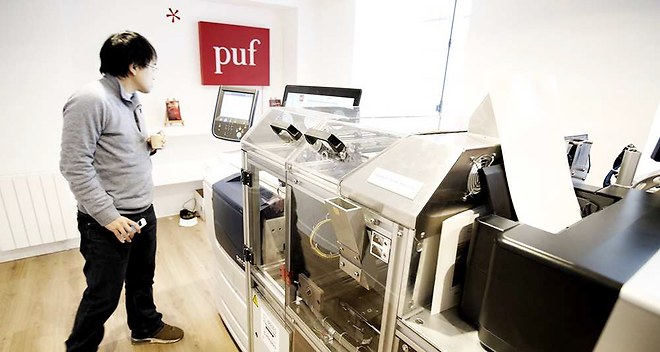Apart from the Strand, I don’t go to brick and mortar bookstores in NYC anymore. There are far fewer in general and far fewer good ones. Sometimes I stop at the bookseller tables occasionally set up outside NYU and pick up a title. That’s pretty much it now for my non-Internet book buying, a surprising turnabout for someone raised on printed matter purchased all over Manhattan, from St. Mark’s to Colosseum to the A&S used magazine shop. Times change.
Paris bookstores have been clobbered by online shopping and rising rents the same way as New York’s, with one classic spot reimagining itself as a volume-less space that allows customers to choose titles from tablets and have them printed instantly on demand. Something is certainly lost without a stock to browse, but it’s better than shuttering for good. I do suppose, however, that when same-day delivery becomes de rigueur, the margins for such a business model will shrink even more.
From Ciara Nugent at the New York Times:
The pronounced stock shortage inside the Librairie des Puf, run by the publisher University Press of France, or Les Puf for short, is not the result of an ordering mistake, but the heart of the shop’s business model.
There are books, but they are not delivered in advance from wholesalers. They are printed on request, before the customer’s very eyes, on an Espresso Book Machine. On Demand Books, the American company that manufactures the machine, chose the name as a nod to an activity you can complete in the five minutes it takes to print a book: Have a quick coffee. …
It is a radical reinvention of a store that first opened its doors in 1921. The original Librairie des Puf occupied a far larger, multilevel space in the corner of Place de la Sorbonne, and had packed window displays and a bustling intellectual crowd from nearby universities. It was long a cultural and academic symbol, until it was forced to close because of falling profits and soaring rents. Then, about 10 years ago, the site was sold to a men’s-clothing chain, much to the chagrin of locals.
But its closing was no exception. From 2000 to 2014, 28 percent of Paris bookstores closed, according to a 2015 report from the Paris Urban Planning Agency, a body assembled by the City Council in 1967 to chart social and economic evolution in the French capital. Crippling rent increases in Paris’s densely populated center were mostly to blame, as well as growing competition from e-commerce sites that are able to offer far more titles than a cramped city bookstore. The decline in sales of newspapers and magazines also contributed, since these are often sold alongside books in French bookstores.•

